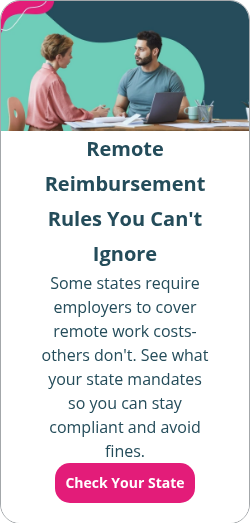What are the most common types of employees?
By Elizabeth Walker on December 6, 2023 at 8:15 AM
If you’re a business owner, you likely already know there are more employee classification options besides full-time. As our labor market becomes increasingly diverse and people find more flexible ways to work, employers may need to expand their workforce to include several different types of employees to meet their growing business needs.
Understanding various types of employment can help you optimize your hiring process, increase productivity, and determine your legal obligations when offering employee benefits and perks like health insurance.
In this article, we’ll discuss what employees are, the most common types, and their eligibility for certain health benefits.
What is an employee?
An employee is an individual that an employer or company hires to perform work or complete services on behalf of that company. According to the IRS1, a person is an employee if an employer controls the work they do. If that person is able to determine for themselves the work that they do and how that work is done, the IRS considers them an independent contractor instead of an employee.
The federal government classifies employees as exempt or non-exempt. Exempt employees generally receive an annual salary (totaling at least $684 per week). They are exempt from certain legal protections under the Fair Labor and Standards Act2 (FLSA), like overtime pay. Non-exempt workers typically receive an hourly wage (totaling at least the federal minimum wage) and have FLSA protections.
The following four factors may qualify an individual as an employee:
- The company’s human resources department includes the individual in their payroll system, onboarding process, organizational chart, etc.
- A written employment contract or agreement between the employer and the individual outlines their job duties, pay rate, pay schedule, work hours, and employee benefit eligibility.
- The individual has certain employee rights and is covered by federal, state, and local employment laws.
- Employers control the individual’s behavior by requiring them to follow company policies, perform certain job responsibilities, and meet specific goals, which can lead to termination if they don’t obey.
In most cases, the IRS requires employers to withhold certain taxes from an employee’s paycheck, such as Social Security, Medicare, unemployment, and income taxes. But, depending on the type of worker, such as leased employees or freelancers, organizations may not be responsible for their payroll or tax reporting requirements.
What are the most common types of employees?
Employers determine an employee's class based on the number of hours worked, job duties, and employment length. However, employee classification can affect eligibility for overtime pay, access to certain company benefits, tax liability, and more.
While employers have some flexibility when determining what qualifies as a particular employee class, they must follow the basic guidelines to ensure they comply with federal and state laws.
To give you a better understanding, we’ll briefly go over six common employee types in the sections below.
1. Full-time employees
The FLSA allows employers to choose the number of hours that equals full-time employment at their individual company. Therefore, a full-time employee is someone who works the number of hours an employer designates as full-time. In most companies, full-time employees typically work 30-40 hours per week.
Full-time employees are sometimes called permanent or regular employees. They can receive hourly or salaried wages, are generally eligible for all benefits and perks, and have employment contracts with or without expiration dates.
The IRS considers an individual a full-time employee if they work at least 32 hours per week. However, there’s a separate definition for full-time employees when considering health benefits. Under the Affordable Care Act (ACA), a full-time employee is someone who works at least 30 hours per week or 130 hours per month.
Employers with 50 or more full-time equivalent employees (FTEs) must offer health insurance to at least 95% of their full-time workers and their dependents to comply with the ACA employer mandate.
2. Part-time employees
Under the ACA, a part-time employee is an individual who works an average of fewer than 30 hours per week or less than 130 hours per month for more than 120 consecutive days.
However, employers only need to consider the ACA’s definition if they have 50 or more FTEs and must offer health benefits. Otherwise, employers can decide what part-time employment looks like at their company. For example, if an employer considers full-time employment 30 hours per week, a part-time employee is someone who works less than that per week.
While they often work on an hourly basis, part-time workers can have salaried wages if the employer chooses. You often don’t have to provide your part-time workers employee benefits. However, some federal guidelines require part-time employees to receive certain benefits in specific situations.
For instance, even if you don’t have 50 or more full-time employees, you can still be subject to ACA requirements. If you have 50 or more FTEs, the IRS also considers you an applicable large employer (ALE). You determine your FTEs by calculating the number of full-time and part-time employees at your organization.
Additionally, if you’re offering a retirement plan to your full-time employees, the Employee Retirement Income Security Act3 (ERISA) allows part-time employees who have worked more than 1,000 hours over a one-year period to also participate in the benefit.
3. Seasonal employees
Seasonal employees are individuals who work during specific times of the year to help employers meet the increased workload of a particular season. Most commonly, companies hire these individuals in the summer to work in the agricultural industry and in the winter to cover the demands of the holiday season. But, companies may also hire seasonal employees for industry-specific reasons, such as needing extra hotel staff during peak vacation times.
Seasonal employees can work full- or part-time hours. Employers can hire them directly through job boards or work with a staffing agency to find qualified candidates. In addition to being eligible for Social Security and unemployment benefits, you should include seasonal employees in your FTE calculation.
If you employ seasonal workers and their hours cause your total number of employees to exceed 50 or more, you may be able to get a seasonal worker exemption so that your seasonal employees don’t cause you to become an ALE4.
4. Temporary employees
Temporary employees are individuals hired directly or through a temp agency to work for a set amount of time or until they complete a specific project.
Unlike seasonal workers, employers seek temporary workers throughout the year for various reasons, such as replacing a full-time employee who has left the company. Their employment contract specifies how long they will work, usually between six months to two years.
Seasonal and temporary staff can work on a full-time or part-time basis. You should classify temporary full-time employees who work at least 30 hours per week as regular full-time employees eligible for benefits. You should include temporary part-time employees should in your FTE count. In either case, they’re eligible for Social Security and unemployment benefits if you hire them directly.
If you hire these employees directly, you’ll need to withhold taxes for them like your full- or part-time employees. If you hire them through an employment agency, they’ll usually handle the employee’s tax withholding.
5. Leased employees
Leased employees, or contract workers, are employees of staffing agencies or other similar companies. Employers looking for skilled workers for a certain period of time or project can contact an agency that will then “lease” them an employee. These employees typically work on loan to the employer for at least a year.
Leased workers can be full- or part-time. Because the staffing agency technically employs them, they handle the payroll process. You pay the agency directly, and then they take a percentage of the funds and pay the employee their portion.
You’re not responsible for withholding taxes for leased workers or providing them employee benefits. If the staffing agency provides benefits, they will offer them to the leased worker directly.
6. Contingent employees
Contingent workers are individuals that employers hire to work on specific projects for a fixed amount of time. You don’t hire them permanently, nor are they your employees. Instead, they enter into an agreement with you to help you complete tasks that fit their skills and background.
Think of a contingent worker as their own boss. They can work for more than one business at a time, set their preferred rate and method of pay, control when and how they work, and file their own taxes. Before working with a contingent employee, you should both outline and agree upon the partnership details with a written contract. Once both parties fulfill the contract, the partnership ends.
Because they’re not employees of your company, you aren’t obligated to provide contingent workers with any benefits or perks.
The following are four common types of contingent workers:
- Independent contractor: An independent contractor is a self-employed worker who provides goods, labor, or services to an individual or business. Unlike permanent employees, they set their own hours, rates, and availability. Their contract can be anywhere between a few months to a few years, and they generally take on one client or long-term project at a time.
- Freelancers: A freelancer is a self-employed professional who provides specific services to individuals or companies. Freelance contracts tend to be short-term, and unlike independent contractors, they typically work on multiple projects simultaneously. They can receive payment by the hour or on a project-by-project basis. Some freelancers with clients requesting multiple services request a monthly retainer fee.
- Interns: An intern works for an individual or company on a paid, semi-paid, or unpaid basis to gain hands-on work experience. Frequently, interns are high school or college students needing college credits or preparing for full-time employment in their chosen field. Internships are usually a few months in length and can potentially lead to full- or part-time paid employment with the company after the internship ends.
- Consultants: A consultant is a self-employed individual who is an expert in their chosen field. Instead of working on a project for a company, they share their knowledge and provide targeted professional advice to help guide the company toward a specific goal. Consultants work on a temporary basis, but some businesses opt to put them on retainer for a fixed fee if they need continuous guidance.
How certain health benefits impact employee class eligibility
As previously mentioned, the ACA only requires ALEs with 50 or more FTEs to offer an affordable health benefit that provides minimum value and minimum essential coverage (MEC) to at least 95% of their full-time employees and their dependents.
If you’re an ALE with employees who work fewer than 30 hours per week, you don’t have to offer them health insurance—-even if you provide it to your full-time workers. But if you have enough part-time, seasonal, or temporary employees who work enough hours to count collectively as 50 or more FTEs, you may become an ALE subject to the employer mandate. If you don’t comply with the mandate, you’ll owe a costly tax penalty to the IRS.
If you have fewer than 50 FTEs, federal law doesn’t require you to offer health insurance coverage to any of your employees. However, offering your full-time, part-time, and contingent employees a health benefit can help you attract talented workers, reduce turnover, and create a more inclusive workplace culture.
Whether or not you’re an ALE, there are a few ways you can provide comprehensive health benefits to your employees—no matter their classification. Let’s go over three options below.
1. Traditional group health insurance
Your first option is traditional group health insurance. Group health insurance is simply a way of providing health insurance to a group of people—individuals can’t enroll in these plans on their own. Employers typically offer group health insurance to their employees as part of their benefits package, and it currently covers roughly 153 million Americans.
While group health plans have some advantages like familiarity, tax advantages, and improved retention, offering one can be time-consuming, expensive, and too rigid to meet all your employees’ needs. For example, if you have remote employees, your group health plan or insurer may not be available where they live.
Even if you’re an ALE with part-time employees that count toward your FTE total, each insurance company has its own rules regarding offering group health insurance to part-time or temporary employees. Some insurers allow it, but some don’t. So, if you employ various kinds of employees and want to offer group health insurance, you may have difficulty finding a plan that will work for everyone.
2. Health reimbursement arrangements (HRAs)
A health reimbursement arrangement (HRA) is an employer-funded health benefit allowing employers to reimburse their employees tax-free for qualified out-of-pocket medical expenses, including individual health insurance premiums. The IRS considers some HRAs group health plans, but employers choose an HRA over traditional group health plans to give their employees greater flexibility over their medical care.
With an HRA, employers choose how much monthly allowance to offer their employees. Once an employee submits proof of an eligible expense, the employer reimburses them up to their set allowance amount. Employer contributions are tax-deductible and free of payroll taxes, plus employee reimbursements are income tax-free, as long as their health plan meets minimum essential coverage (MEC).
|
HRA type |
How it works |
How it supports different types of employees |
|
Qualified small employer HRA (QSHERA) |
A QSEHRA is for small employers with fewer than 50 FTEs. With a QSHERA, employees can receive reimbursements for their individual health plan premiums and qualified out-of-pocket expenses. However, QSEHRAs have annual maximum contribution limits set by the IRS. |
All W-2 full-time employees are automatically eligible to participate in a QSEHRA. You can offer the QSEHRA to your part-time employees as well. However, you must give the same allowance amount to both groups. Temporary and contingent employees aren’t eligible for the QSEHRA. |
|
Individual coverage HRA (ICHRA) |
An ICHRA is for employers of all sizes that can reimburse employees for their individual health insurance premiums and other out-of-pocket expenses. ICHRAs have no minimum or maximum contribution limits and are an excellent solution for ALEs looking to satisfy the employer mandate as long as their benefit is affordable. |
ICHRAs offer the best coverage if you employ multiple types of employees. You can offer an ICHRA to 11 employee classes and set a customized allowance amount for each class. Employee class options include full-time, part-time, exempt, non-exempt, seasonal, leased, trade union, and employees working abroad. With PeopleKeep, only the full-time, part-time, seasonal, salaried, non-salaried, and state-based classes are available. |
|
Group coverage HRA (GHCRA) |
Also called an integrated HRA, a GCHRA supplements an employer-sponsored group health plan. Employees can use their allowance to pay for out-of-pocket medical costs their group plan doesn't fully cover. Like ICHRAs, GCHRAs have no minimum or maximum contribution limits. |
You can offer a GCHRA to seven employee classes and set a customized allowance amount for each class. Employee class options include full-time, part-time, exempt, and non-exempt employees. |
3. Health stipends
The most flexible way to support all your employees, regardless of their classification, is with a health stipend. A health stipend is a fixed amount of money offered to employees to help pay for health insurance coverage and other medical expenses.
With a health stipend, employees can choose the healthcare items that suit their needs, and employers can choose monthly allowance caps, giving them total control over their healthcare benefits costs. Employers typically add stipends to an employee’s paycheck as extra income, so they’re subject to payroll and income taxes.
Every type of employee is eligible for a stipend, including full-time, part-time, seasonal, temporary, leased, and contingent employees, like 1099 contractors and international workers, making it an inclusive health benefit option. They’re also an easy and compliant way to support employees who qualify for premium tax credits or other health insurance subsidies.
Keep in mind that stipends are not considered formal health benefits, unlike HRAs and traditional group health insurance. Therefore, you can’t require your employees to prove they spent their allowance on a health insurance policy or qualified medical items listed in IRS Publication 502.
Conclusion
Having various employee classes helps your company stay efficient, flexible, and productive. But before you begin hiring, make sure you know the differences between each employee type so you can comply with federal and local employment laws, offer the correct benefits, and choose the right people who can help grow your business.
Even if you’re not an ALE, offering your full-time, part-time, temporary, or contingency workers a health benefit can attract and retain talent, encourage a healthy workforce, and show workers you care about their overall well-being—regardless of employment classification.
- https://www.irs.gov/businesses/small-businesses-self-employed/employee-common-law-employee
- https://www.dol.gov/agencies/whd/flsa
- https://www.dol.gov/general/topic/retirement/erisa
- https://www.irs.gov/affordable-care-act/employers/determining-if-an-employer-is-an-applicable-large-employer#:~:text=or%20more%20information.-,Seasonal%20Workers,-When%20determining%20if
Check out more resources
See these related articles

Five tips to start offering employees health benefits
Learn five essential tips for offering health plans for employees. Discover how to choose the right benefits to attract and retain top talent.

Do employers have to offer health insurance to part-time workers?
See if employers are obligated to provide health insurance to part-time employees in this informative post. Learn about the regulations and requirements.

How startups can offer health coverage
Startups may not have the same resources as larger companies, but offering health coverage is still possible. Learn how startups can provide health insurance.



